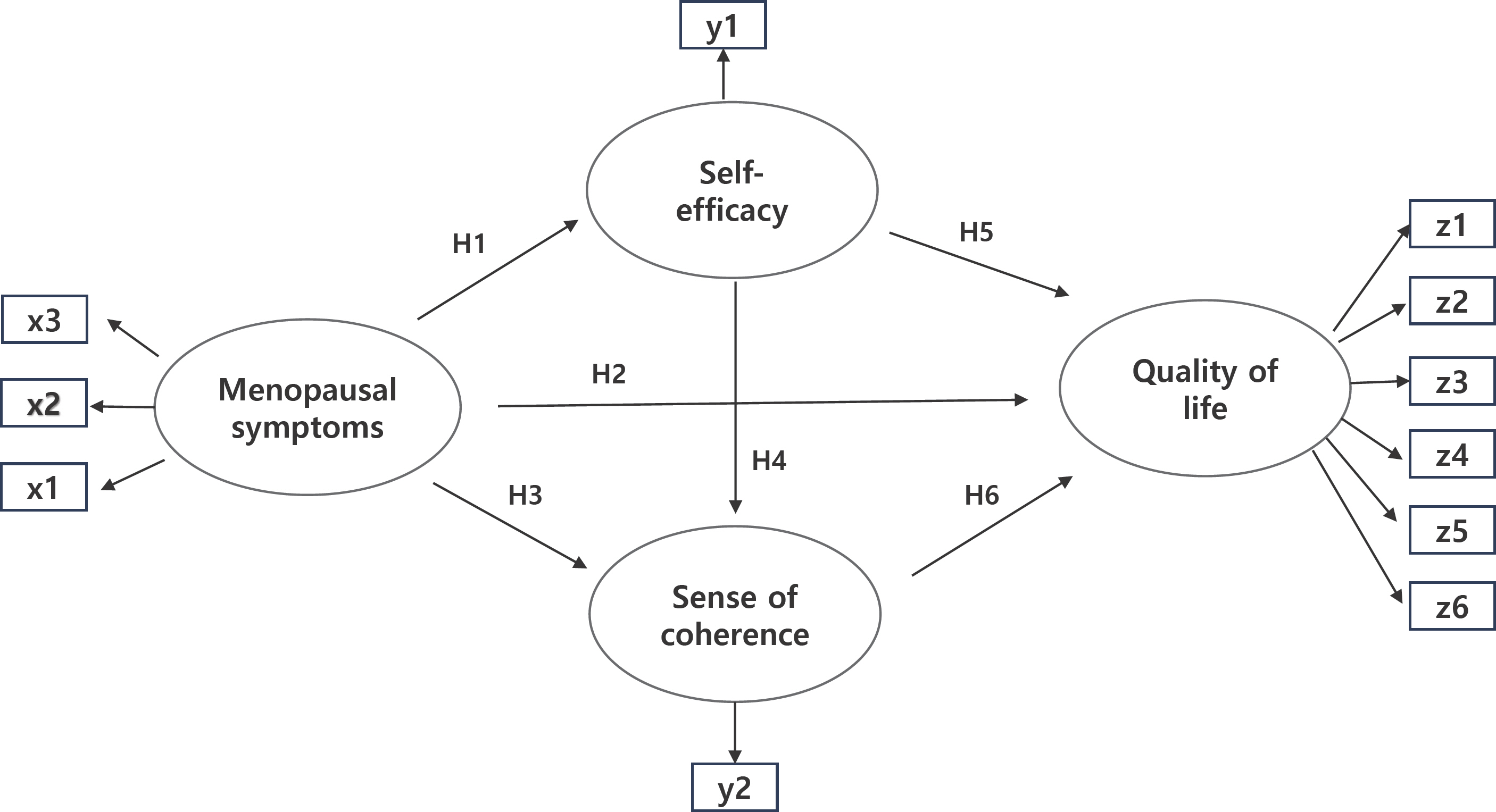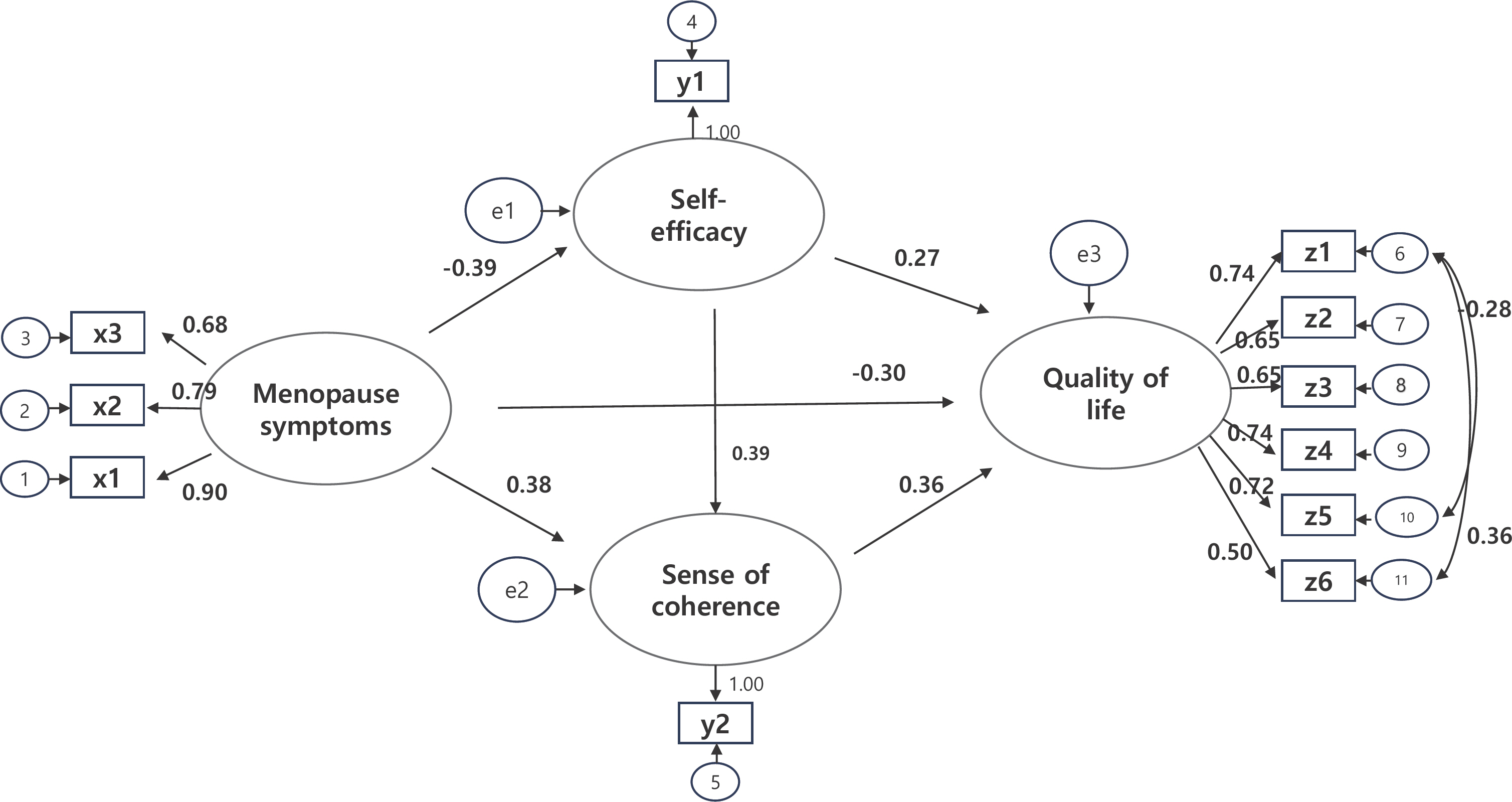J Korean Soc Matern Child Health.
2023 Oct;27(4):238-246. 10.21896/jksmch.2023.27.4.238.
The Impact of Salutogenic Factors on the Quality of Life in Climacteric Women
- Affiliations
-
- 1College of Nursing, Gyeongsang National University, Jinju, Korea
- 2Department of Nursing Science, Kyungsung University, Busan, Korea
- KMID: 2547474
- DOI: http://doi.org/10.21896/jksmch.2023.27.4.238
Abstract
- Purpose
The objective of this study was to develop a structural model to assess and forecast the quality of life in climacteric women, focusing the concept of salutogenesis.
Methods
Participants were sourced from two urban locations through convenience sampling. Data collection involved questionnaires, analyzed using SPSS 21.0 and AMOS 20.0. Assessment instruments comprised the Menopause Rating Scale, New General Self-Efficacy Scale, Sense of Coherence Scale, and the Korean version of the WHOQOL-BREF.
Results
The fit indices of the proposed model met recommended standards. The sense of coherence, menopausal symptoms, and self-efficacy accounted for 58% of the quality of life variance, with sense of coherence emerging as the most significant predictor. Menopausal symptoms directly and negatively affected quality of life (β=-0.30, p<0.001), and had an indirect influence through self-efficacy and integration (β=-0.30, p<0.001). Self-efficacy positively influenced quality of life directly (β=0.27, p<0.001) and indirectly through integration (β=0.14, p=0.001). Integration positively affected quality of life directly (β=0.36, p<0.001).
Conclusion
Interventions to bolster sense of coherence are crucial for enhancing the quality of life among climacteric women.
Figure
Reference
-
Antonovsky A. The salutogenic model as a theory to guide health promotion. Health Promot Int. 1996. 11:11–8.
ArticleAntonovsky A. Unraveling the mystery of health: How people manage stress and stay well. San Francisco (CA): Jossey-Bass;1987. p. 15–162.Chen CH., Booth-LaForce C., Park HJ., Wang SY. A comparative study of menopausal hot flashes and their psychosocial correlates in Taiwan and the United States. Maturitas. 2010. 67:171–7.
ArticleChen G., Gully SM., Eden D. Validation of a new general self-efficacy scale. Organ Res Methods. 2001. 4:62.
ArticleCho EH., Sung KW. Comparative study on depressive symptoms, marital intimacy and health-related quality of life according to the severity of menopausal symptoms. Global Health Nurs. 2019. 9:1–9.Cho HJ., Ahn SH. Middle-aged women's experiences of physical activity for managing menopausal symptoms: a phenomenological study. Korean J Women Health Nurs. 2023. 29:104–14.
ArticleChoi HJ., Oh HJ. Menopause. Korean J Fam Prac. 2020. 10:158–63.
ArticleChoi JH. Theoretical considerations on salutogenesis for the development of mental health and moral education of college students-on the Basis of Aaron Antonovsky's concept of ‘sense of coherence’. J Ethics Educ Stud. 2017. 44:191–217.
ArticleEriksson M., Lindström B. Antonovsky's sense of coherence scale and the relation with health: a systematic review. J Epidemiol Community Health. 2006. 60:376–81.
ArticleHaoka T., Sasahara S., Tomotsune Y., Yoshino S., Maeno T., Matsuzaki I. The effect of stress-related factors on mental health status among resident doctors in Japan. Med Educ. 2010. 44:826–34.
ArticleHeinemann K., Ruebig A., Potthoff P., Schneider HP., Strelow F., Heinemann LA, et al. The menopause rating scale (MRS) scale: a methodological review. Health Qual Life Outcomes. 2004. 2:45.Hong EY., Kang YS., Ha YM. Factors affecting on health promoting behaviors among teachers with middle-aged women experiencing Menopause. Korean J Occup Health Nurs. 2013. 22:66–74.
ArticleKamradt M., Ose D., Krisam J., Jacke C., Salize HJ., Besier W, et al. Meeting the needs of multimorbid patients with type 2 diabetes mellitus-a randomized controlled trial to assess the impact of a care management intervention aiming to improve self-care. Diabetes Res Clin Pract. 2019. 150:184–93.Kim KS., Choi SM., Han KY. Structural equation modeling on health status in hospital nurses: based on the theory of salutogenesis with bio behavioral approach. J Korean Bio Nurs Sci. 2015. 17:50–9.
ArticleKim SJ., Kim YR., Lee OS., Choi SY. The relationship between menopausal symptoms, perceived awareness of menopausal symptom, menopausal attitude and menopausal management in middle age women. J Korea Converg Soc. 2021. 12:347–56.Kong TM. Structural equation modeling on health status in police officers: based on the theory of salutogenesis. Korean Assoc Police Sci Rev. 2021. 23:1–36.
ArticleKorean Statistical Information Service. Life expectancy [Internet]. Daejeon (Korea): Statistics Korea;2023. [cited 2023 Jan 31]. Available from: www.kosis.kr/index/index.do.Krause CH., Fidelman M. Exploring mental health: theoretical and empiricaldiscourses on salutogenesi. Lengerich: Pabst Science Publishers;2012.Lezwijin J., Vaandrager L., Naaldenberg J., Wagemakers A., Koelen M., Woerkum CV. Healthy ageing in a salutogenic way: building the HP 2.0 framework. Health Soc Care Community. 2011. 19:43–51.
ArticleMin SK., Lee CI., Kim KI., Suh SY., Kim DK. Development of Korean version of WHO quality of life scale abbreviated version (WHOQOL-BREF). J Korean Neuropsychiatr Assoc. 2000. 39:571–9.Oh IS. General self-efficacy: the concept, measurement issues, and implications for HRM. Korean J Ind Organ Psychol. 2002. 15:49–72.Park HJ. A Structural equation model of health-related quality of life in postmenopausal women with metabolic syndrome [unpublished doctoral dissertation]. Busan (Korea): Inje University;2022.Rathnayake N., Lenora J., Alwis G., Lekamwasam S. Prevalence and severity of menopausal symptoms and the quality of life in middle-aged women: a study from Sri Lanka. Nurs Res Pract. 2019. 2019:2081507.
ArticleShin HS., Lee EJ. Factors influencing quality of life in postmenopausal women. Korean J Women Health Nurs. 2020. 26:336–45.
ArticleSu J., Jogamoto A., Yoshimura H., Yang LJ. Menopausal symptoms among Chinese and Japanese women: differences and similarities. Menopause. 2021. 29:73–81.
ArticleYu JP. A Study on the effect of sample size and normality on the fit index and pathcoefficient of the research in structural equation modeling. J Product Res. 2023. 41:1–6.Weidner K., Croy I., Siepmann T., Brahler E., Beutel M., Bittner A. Menopausal syndrome limited to hot flushes and sweating a representative survey study. J Psychsom Obstet Gynecol. 2017. 38:170–9.
Article
- Full Text Links
- Actions
-
Cited
- CITED
-
- Close
- Share
- Similar articles
-
- Comparison of Climacteric Symptoms, Quality of Life, and Self-Care Attitudes before and during the COVID-19 Pandemic
- Impact of Climacteric Symptoms and Fatigue on the Quality of Life in Breast Cancer Survivors: The Mediating Effect of Cognitive Dysfunction
- A Comparative Study on Climacteric Symptoms of Natural Menopausal Women and Artificial Menopausal Women
- Influencing Factors on Quality of Life in Pre- and Postmenopausal Women
- The Climacteric Symptoms and Quality of Life in Climacteric Women according to Hormone Replacement Therapy



